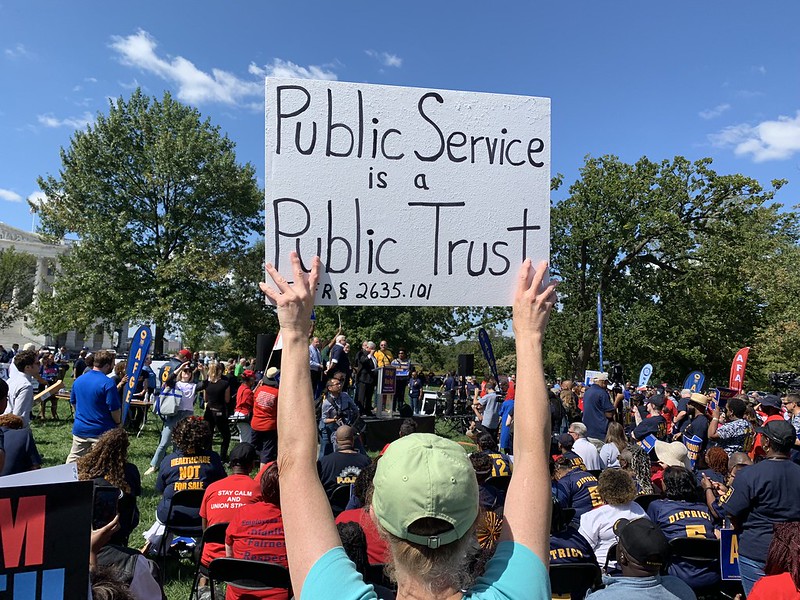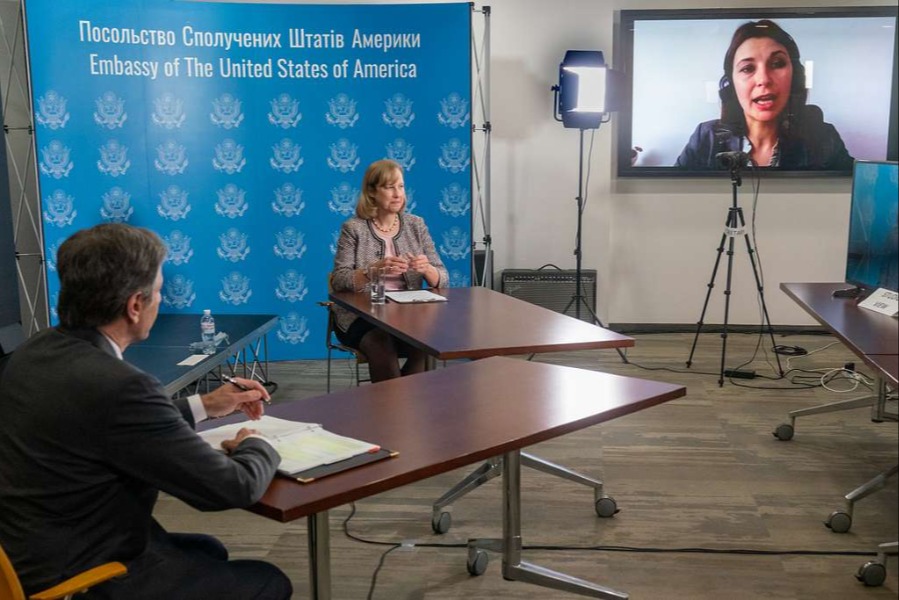The D.C. Circuit’s En Banc Decision in Bahlul: Sui Generis or Guidance for Future Military Commissions?
The en banc D.C. Circuit’s affirmance of the military commission conviction of Ali Hamza al Bahlul for conspiracy (see Lawfare’s summary here) solidifies the legitimacy of commissions in U.S. counterterrorism law and policy. As President Obama put it in his 2009 National Archives speech, commissions have played a role in U.S. armed conflicts since the Revolutionary War.
Published by The Lawfare Institute
in Cooperation With

The en banc D.C. Circuit’s affirmance of the military commission conviction of Ali Hamza al Bahlul for conspiracy (see Lawfare’s summary here) solidifies the legitimacy of commissions in U.S. counterterrorism law and policy. As President Obama put it in his 2009 National Archives speech, commissions have played a role in U.S. armed conflicts since the Revolutionary War. However, the six judges who voted to affirm Bahlul’s conviction as consistent with the U.S. Constitution’s Article III also focused on a matter related to this particular case: Bahlul, in the words of Judge Patricia Millett’s concurrence, “actively prepared for al Qaeda’s attacks on the United States on September 11, 2001.” For judges Patricia Millett and Robert Wilkins, who supplied the margin of victory for the government in the 6-3 decision, Bahlul’s 9/11 role was central. (Jim Schoettler and I filed an amicus brief supporting affirmance on behalf of a group of scholars and former JAGs and national security officials; Judge Wilkins cited our brief in his concurrence.)
Bahlul’s 9/11 role allowed judges Millett and Wilkins to resolve this case narrowly. The Supreme Court’s 1942 decision in Ex parte Quirin held that military commissions can try defendants for violations of the laws of armed conflict (LOAC), even though the specialized judges in those tribunals lack Article III’s safeguards of lifetime tenure and protected levels of compensation. International treaties and tribunals interpreting LOAC have authorized conspiracy as a form of liability for a completed offense, such as the murder of civilians. On this view, those who plot the murder of civilians that actually occurs are just as guilty as those who pull the trigger. However, treaties and transnational tribunals have generally been wary of recognizing liability for inchoate conspiracy, which entails mere agreement without a completed offense (genocide is the sole exception). The targeting of civilians that occurred on September 11 was a completed offense under LOAC (assuming that as of September 11 the U.S. was in an armed conflict with Al Qaeda – a matter not at issue in Bahlul’s case). Focusing on Bahlul’s role in the attacks, which under international law could merely entail serving as a “cog in the wheel,” makes rejection of Bahlul’s Article III challenge relatively straightforward.
To support this view, both Judge Millett and Judge Wilkins cited Bahlul’s admitted administration of the bayat (the Al Qaeda loyalty oath) to Mohamed Atta, the straw boss of the 9/11 attacks’ operational phase, and Ziad Jarrah, the hijacker-pilot of United Airlines Flight 93, which crashed in Pennsylvania. Also relevant was Bahlul’s service as a “minder” to Atta and Jarrah who kept the two on task during their stay at Osama bin Laden’s compound prior to the attacks. Furthermore, judges Millett and Wilkins cited Bahlul’s role in the preparation of Atta and Jarrah’s “martyr wills,” which spun their twisted motives for the benefit of future Al Qaeda recruits.
For Judge Wilkins, the tracking of this conduct in the charges’ overt act specifications, the proof at trial, and the specific findings by members of the military commission provided sufficient indicia of choate character to bring Bahlul’s conviction under Quirin’s rubric. The only element necessary for conspiracy as a form of liability missing from Bahlul’s conviction was a formal finding that 9/11 actually occurred. However, apart from conspiracy theory “truthers,” no one seriously disputes the essential facts of the attacks. Despite the lunacies of truthers, birthers, and other acolytes of delusionary theories that have become salient in this bizarre election season, the failure to formally find that 9/11 actually happened seems like an awfully thin reed for vacating a conviction that in other respects clearly charged and adjudicated violations of international law.
Judge Millett’s concurrence, in addition to stressing Bahlul’s role in the 9/11 attacks, centered on another aspect particular to this case: Bahlul’s forfeiture of his argument that Article III permitted his trial only in an Article III court, not in a military commission. Judge Millett found that Bahlul’s failure to raise this claim below shifted the standard of review applicable to his conviction. Instead of reviewing the conviction de novo, the court according to Judge Millett should review only for plain error.
As Judge Millett put it, limiting review when a defendant has failed to make an argument below “serves a vital function in the criminal justice system”: it makes judicial proceedings manageable and facilitates orderly appellate review by assuring that a trial court has the opportunity to create a record on all relevant issues. According to Judge Millett, defendants like Bahlul who seek to pick and choose when they will litigate vital issues do a disservice to the system. While a specific objection by a defendant at trial will preserve his or her claims, the “generic diatribe” launched by Bahlul, who rejected the United States’ “earthly laws and international earthly laws,” did not meet this standard. Based on this view, Judge Millett also found that Bahlul’s challenge did not go to the non-forfeitable issue of subject matter jurisdiction, but simply to Congress’s power. Analyzing Bahlul’s conviction on a plain error standard, Judge Millett agreed with Judge Wilkins that the charges, proof, and findings in the case were sufficiently choate in character to support military commission jurisdiction. Specifically, Judge Millett cited the links to Bahlul’s admitted role in the completed crime of the 9/11 attacks.
The sui generis nature of Bahlul’s conviction, which mattered to judges Millett and Wilkins in this 6-3 case and therefore supplied the margin of victory for the government, may dissuade the Supreme Court from granting certiorari, as Steve suggests. However, the Court may believe that guidance on future commission cases is also useful, making certiorari more likely. To provide such guidance, Judge Brett Kavanaugh wrote for judges Griffith, Henderson, and Brown in taking an expansive view of Congress’s power to enact military commissions (Henderson also incorporated by reference her insightful dissent to the earlier panel opinion that the full D.C. Circuit vacated). Judges Rogers, Tatel, and Pillard, who dissented, sought to provide guidance that would sharply limit Congress’s authority.
Judge Kavanaugh’s expansive view would untether Congress’s power from international law. Even though the Define and Punish Clause, which authorizes Congress to define and punish offenses against the “law of nations,” has frequently been viewed as the source of Article I authority to convene military commissions, Judge Kavanaugh took a wider view, regarding Congress’s war powers, taken together, as supplying the requisite authority. Based on this wider view, Judge Kavanaugh declined to pinpoint the “outer boundaries” of Congress’s power to establish military commissions, except to assert that this power can be exercised over enemy belligerents and has no necessary relationship to international law. Based on this analysis, Judge Kavanaugh asserted that even a purely inchoate conspiracy to commit a war crime can be tried by a military commission.
My own view (see my article here) is that international law does indeed provide a limit, but one outfitted with a measure of deference to Congress’s Article I authority over wartime exigencies. Based on this analysis, a charge with a reasonable relationship to an acknowledged war crime would be triable in a military commission. An inchoate conspiracy to murder civilians would meet this standard, even without a completed act; Congress should not be obliged to wait until an enemy belligerent’s murderous designs ripen into actual mayhem. However, conspiracy to commit offenses not recognized under international law, such as the mere donation of money to a terrorist group, should be tried in Article III courts.
The dissent by judges Rogers, Tatel, and Pillard took another tack entirely, rejecting this view, Judge Kavanaugh’s more expansive account, and the case-specific view adopted by judges Millett and Wilkins. The dissenters asserted that Article III restricts Congress, even in cases involving enemy belligerents who have plotted to commit acknowledged war crimes. This grudging account of Congress’s wartime authority is at odds with the Framers’ understanding that Congress needs some latitude in its authority under the Define and Punish Clause. The best indication of the joint dissent’s misunderstanding of the Framers’ scheme is its treatment of Justice Story’s landmark 1820 opinion in a piracy case, United States v. Smith. Justice Story, noting the Framers’ awareness that ever-evolving international law could never be “completely ascertained and defined,” asserted that the Define and Punish Clause contemplated a measure of deference to Congress. In this respect, Justice Story was echoing Madison, who argued in Federalist No. 42 that “[f]or the sake of certainty and uniformity,” it was “necessary and proper” for Congress to have a measure of discretion in defining offenses against international law.
It is reasonable to assume that the Framers wished Article III to track the latitude that the Define and Punish Clause supplied, particularly in the exigencies of wartime. The joint dissent discounts this logic, transforming Justice Story’s reasoning into a strict limit on Congress’s power – exactly what Story wished to avoid. However, the dissent is correct that Judge Kavanaugh’s opinion does not cabin military commissions sufficiently, particularly regarding adjudication of conduct that does not violate international law, such as mere donations to terrorist groups.
In sum, the distinctive nature of Bahlul’s case makes it an imperfect vehicle for broader pronouncements on Congress’s power to establish military commissions. The opinions of judges Millett and Wilkins make this clear, anchoring their views in this case’s special circumstances. An authoritative decision on military commissions should await a case that clears away those distractions, allowing courts to squarely confront the broader issue of Congress’s power to establish military commissions during armed conflicts.





